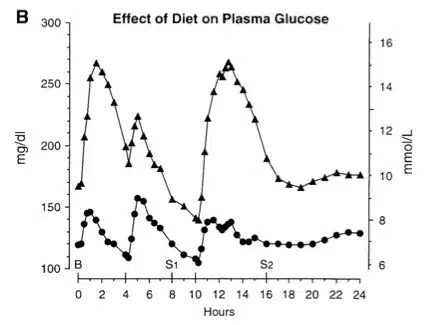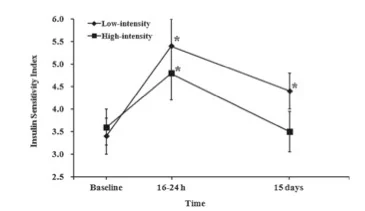The research linking elevated blood sugar to most diseases is frightening, but there are many research proven methods you will learn in this article on how to improve and manage your blood sugar level. Over the long-term this will lead to improvements in general health and most other aspects of life, including improved brain function, energy levels, hormone health, fat loss, decreased disease risk and collectively, increased life expectancy!
As with most things, there is one key variable involved in blood sugar health.
Your Diet AND Blood Glucose Levels
A big aspect of blood sugar control and improving insulin sensitivity is the food you eat. In addition to exercise, your diet probably has one of, if not the biggest, impact on your blood sugar levels.
Firstly, excessive calorie intake not only leads to weight gain, but also makes the body insulin resistant (1). In other words, your body stops its correct handling and function of the blood sugar. By reducing your calorie intake, you can significantly improve fat loss, health and your blood sugar levels.
The good news is that it doesn’t take much weight loss to greatly increase insulin sensitivity. In fact, modest weight loss of only 10 lbs has been shown to cause a 30% improvement in insulin sensitivity (2).
Along with eating less and optimizing your calorie intake, there are other ways you can change your diet to improve your health and blood sugar levels.
These include:
Control your carbohydrate intake
- Studies have shown that balancing your carbohydrate intake throughout the day may help (3, 4)
- Low carb diets have also been shown to be effective (5, 6, 7) .
- Even just monitoring how you respond to different amounts and types of carbohydrates (sustained energy versus lethargy and crashes) can be important (8).
- In the graph below, one study found a 5 week high protein, low-carb diet (black circles) drastically improved fasting blood sugar levels compared to the pre testing levels (triangles) (9).

Balance omega 3 and omega 6 fat intakes (10)
- Reduce your processed food intake which has a high amount of omega 6 fats.
- Increase your intake of omega 3 fatty acids through consumption of oily fish, supplementing with fish oil, or eating free range meat and poultry.
- If supplementing, aim for 3 – 5 grams of fish oil per day with a high EPA and DHA content.
- Reduce your consumption of processed foods and hydrogenated oils, often found in sugar snacks, biscuits, pastries and ice cream.
Increase your fiber intake (12, 13)
- Select high fiber options such as vegetables, fruits, beans, and whole grains.
- If struggling with your fiber intake you may consider a fiber supplement (5 – 10g, 1 – 2 times per day), including ones with beneficial prebiotics such as Inulin.

Take a Peek Inside AFPA’s Holistic Nutrition Coach Certification
Curious what it’s really like to study holistic nutrition at a professional level? Get the free course preview and see the actual learning modules, frameworks, and real-world coaching applications that prepare AFPA graduates for success.
- Along with blood sugar control, water has numerous benefits for general health, disease risk, weight loss and exercise performance.
- Aim to drink 3 liters or more per day, especially if exercising or if you live in a hot and humid climate.
The benefits of exercise on your blood glucose levels
Insulin resistance is becoming one of the most common and serious health issues, and is affected by lack of physical inactivity (16, 17).
Our society is built for convenience and inactivity, where we sit at work all day, commute an hour a day in the car, drive through fast food restaurants, sit in front of the TV at night, etc. This is the perfect storm for fat gain, altered blood sugar levels and disease.
The good news is that being more active, regardless of intensity, can improve insulin sensitivity. Better yet, you don’t need to spend hours exercising per day!
The best combination is a mixture of aerobic (cardio) and anaerobic (weightlifting/sprinting) activities (18, 19, 20). However, even just a walk around the neighborhood may help to keep you insulin sensitive (21)!
Numerous studies have proven the benefits of exercise on blood sugar control and insulin sensitivity. Again, this doesn’t take hours per day or months to achieve. In the graph below, they found 15 days of high intensity training improved insulin sensitivity by over 20%.

Whatever your exercise choice, perform it on a regular basis and with mixed intensities. Even just 15 minutes of exercise per day can have a profound impact on our health.
Sleep More to Improve Blood Sugar Levels
In the last 50 years, self-reported sleep duration in the United States has decreased by 1.5–2 hours due to lifestyle changes in our society (22) .
Coincidence or not, at the same time, risk of obesity and diabetes has greatly increased (23, 24). While sleep isn’t the ONLY cause of ill health and obesity, it certainly plays an important role.
A poor night’s sleep in humans alters multiple metabolic pathways, leading to increased insulin resistance, decreased energy expenditure, increased appetite, and changes in the immune system (25, 26, 27, 28, 29, 30, 31, 32, 33, 34).
Combined, these all negatively affect blood sugar and of course, long-term health.
Adults should sleep 7 or more hours per night (8+ hours for young adults or athletes) on a regular basis to promote optimal health and blood sugar levels (35).
Reduce Stress to Help Blood Glucose
Chronic stress and depression are increasingly being recognized as independent risk factors for decreased insulin sensitivity, poor blood sugar management and the development of diabetes (36).
Just like when we don’t get enough sleep, the stressors in our life can start to affect the way our body handles the carbohydrates we eat.
Along with impairing our blood glucose levels, stress can increase fat storage and long-term stress can be a serious risk factor for several diseases.
The important thing is that you re-frame how you interpret stress and give yourself relief from the stress you accumulate throughout the day.
Take a break from work, go for a stroll, and make time for the things you enjoy, meditate, give gratitude, adopt a positive mindset and try to reduce stress on a daily basis.
Consider These Supplements
While it is important to address the fundamentals such as diet and exercise first, supplementation may help to control blood sugar and improve health.
One of the most effective supplements is Berberine, a herb-based supplement that has been used in alternative medicine for many years.
Berberine has been shown to be just as effective as the commonly prescribed diabetes drug Metformin. It works by pushing blood sugar into muscle cells and has been used recently in the treatment of diabetes (37, 38).
Take 900-2000 mg per day Berberine with meals, over 3-4 doses.
Other beneficial supplements may include chromium, fenugreek, zinc and even protein supplements such as Whey.
Summary
As you can see, controlling your blood sugar levels is critical for optimal health.
There is no one “perfect” method, after all, the best way is to live a healthy lifestyle with plenty of exercise, a good whole food diet, low stress, adequate sleep etc.
Even small changes in your lifestyle can result in dramatic improvements in your blood sugar levels.
Overtime, this may help you feel better on a daily basis, improve your health, reduce disease risk, help you lose fat and, in the long term, improve life expectancy.



